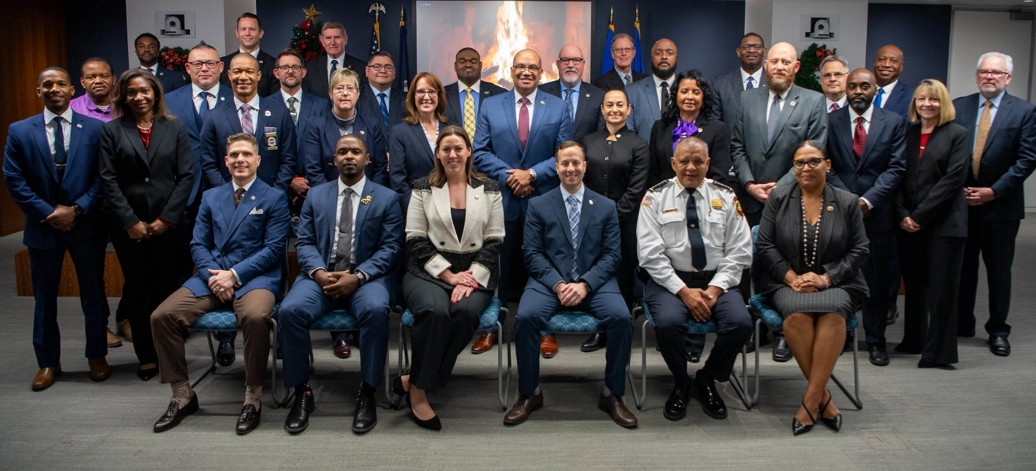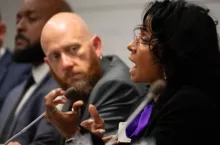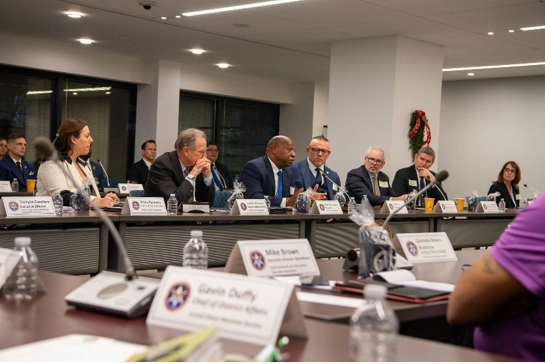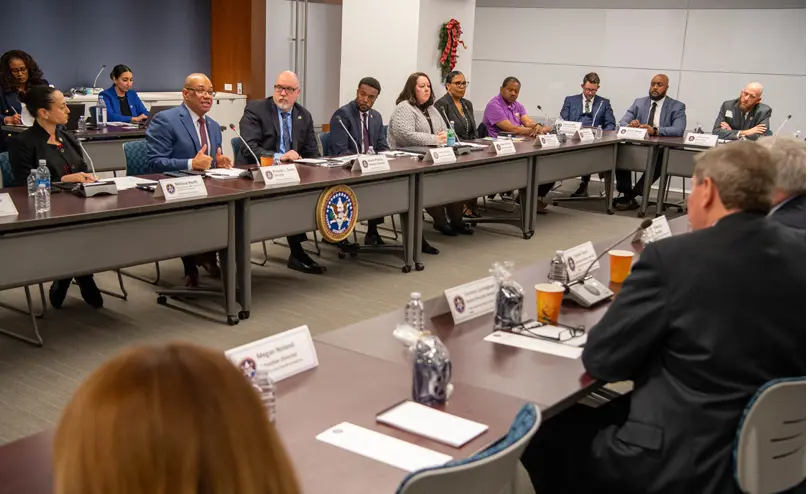
2024 USMS Law Enforcement Association Roundtable Highlights Partnerships, Wellness, and Leadership Transition
For immediate release

The United States Marshals Service (USMS) convened its annual Law Enforcement Association Roundtable on December 18, 2024, uniting law enforcement leaders from across the Nation to discuss partnerships, wellness, and leadership transitions.
The USMS Law Enforcement Association Roundtable brought together distinguished leaders representing a diverse range of organizations in law enforcement and public safety. Participants included Catrina Bonus, Executive Director of Women in Federal Law Enforcement (WIFLE); Mike Brown, Executive Director of Operations for the Small and Rural Law Enforcement Executives Association (SRLEEA); John Drake, President of the Police Executive Research Forum (PERF); Jonathan Thompson, Executive Director and CEO of the National Sheriffs’ Association (NSA), accompanied by Yesim Karaman, Director of Government Affairs for NSA; Humberto I. Cardounel, Jr., Senior Director of Training and Technical Assistance for the National Policing Institute (NPI); Dwayne Crawford, Executive Director of the National Organization of Black Law Enforcement Executives (NOBLE), alongside Jeffrey Glover, President of NOBLE; Gina Hawkins, President of the National Association of Women Law Enforcement Executives (NAWLEE), accompanied by Josh Bronson, Chief of Staff for NAWLEE; Shane Liu, President of the National Asian Peace Officers Association (NAPOA); Terrence Cunningham, Deputy Executive Director of the International Association of Chiefs of Police (IACP), and Vincent Talucci, Executive Director and CEO of IACP; Michael Reese of the Hispanic American Police Command Officers Association (HAPCOA); Dominick Stokes, Vice President of the Federal Law Enforcement Officers Association (FLEOA), along with Mathew Silverman, President of FLEOA; and representatives from the Arizona Homeland Security Office, Kim O’Connor, Director, and Susan Dzbanko, Deputy Director.
In his opening remarks, Director Ronald L. Davis highlighted the importance of collaboration in achieving the USMS’s mission. “Our work depends on the strength of our relationships,” he said. “Leadership changes, but the commitment to collaboration must remain constant. That’s what the American people deserve.”

The emphasis on partnerships resonated with attendees. Gina Hawkins, President of the National Association of Women Law Enforcement Executives (NAWLEE), praised the USMS for fostering meaningful collaboration. “The partnerships we’ve built with the USMS are invaluable,” Hawkins said. “It’s these connections that help us protect our communities more effectively.”
Jonathan Thompson, Executive Director of the National Sheriffs’ Association (NSA), echoed this sentiment, describing the federal-local relationship as “a force multiplier.” He added, “None of us can do it alone.”
Participants also explored shared challenges, including combating violent crime and addressing limited resources. Director Davis highlighted the vital role partnerships with over 16,000 local, state, and tribal agencies play in overcoming these obstacles. “This work is never done alone,” he said. “We’re stronger when we collaborate.”

Discussions at the roundtable also reflected on the USMS’ critical role in ensuring public safety nationwide. From leading efforts to apprehend violent fugitives to supporting local law enforcement through task forces and training programs, the Agency’s contributions extend far beyond federal operations. With over 4,000 Task Force Officers embedded across the country and partnerships involving more than 16,000 law enforcement agencies, the USMS serves as a cornerstone of public safety infrastructure. “The American people are the ultimate beneficiaries of this work,” Davis said. “We owe it to them to continue delivering results.”
As the discussion progressed, the focus shifted to the well-being of officers, a crucial factor in sustaining public safety efforts. Recent tragedies – including the events that occurred in Charlotte, North Carolina, on April 29, 2024, that tragically took the lives of Deputy U.S. Marshal Thomas Weeks, Task Force Officers William “Alden” Elliott and Samuel “Sam” Poloche of the North Carolina Department of Adult Correction, and Police Officer Joshua Eyer of the Charlotte-Mecklenburg Police Department – highlighted the importance of providing ongoing support for those impacted by such losses.
The USMS’ Center of Excellence within the Center for Officer Safety and Wellness was highlighted as a critical resource for addressing the mental health and well-being of officers. Director Davis emphasized the importance of continuing partnerships with the Department of Justice’s Office of Community Oriented Policing Services (COPS) to expand access to these programs for local and tribal officers. “Providing accessible, high-quality training benefits not just for the USMS, but the entire law enforcement community,” Davis said.
“These are not normal circumstances,” Davis added. “We must ensure our people have the resources to address the cumulative stress of their work, not just after a crisis, but throughout their careers.”
Participants commended the USMS’ peer support programs, such as the Critical Incident Response Team (CIRT), which provides follow-up care to officers and their families after traumatic events. “This kind of care shows officers that we don’t just care in the moment, we’re here for the long haul,” one attendee noted.
As the USMS prepares for a leadership transition, Director Davis called on attendees to continue supporting the Agency. He reminded participants that this was not the Agency’s first transition, pointing to its history of navigating changes in leadership since its establishment under President George Washington in 1789. Comparing the process to a relay race, Davis said, “The handoff must be seamless. Each generation must run faster and harder to move the mission forward.”
Director Davis also emphasized the need to “brand” the law enforcement profession better, ensuring the public understands the critical and often unseen work performed daily by officers. “The extreme moments—heroism or mistakes—often define public perception of our profession,” Davis said. “We must do a better job of showing the consistent dedication and service that law enforcement professionals provide every single day.”
Director Davis closed by expressing gratitude for the partnerships that have defined his tenure. “It’s been the greatest honor of my career to serve alongside you,” he said. “Together, we’ve made a difference, and I am confident that these partnerships will continue to strengthen public safety for years to come.”

Additional information about the U.S. Marshals Service can be found at https://www.usmarshals.gov.
####
America’s First Federal Law Enforcement Agency

